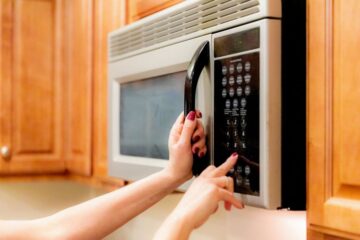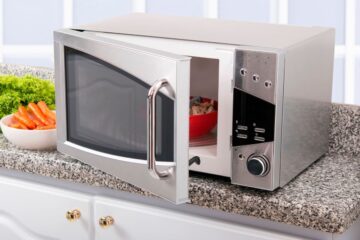Microwaves are a staple in most households, providing quick and convenient heating for food and drinks. However, one common complaint about microwaves is their loud noise. This noise can range from a high-pitched beep to a loud hum and can be pretty disruptive. The cause of this noise can vary, but it is usually related to the internal mechanics of the microwave. The high-voltage transformer, magnetron, and fan all increase the noise level.
Additionally, certain factors, such as the microwave’s age and the magnetron’s strength, can also affect the noise level. In this article, we will explore the reasons why are microwaves so loud and what can be done to mitigate the noise.
Should Microwaves Be Loud?
No, microwaves should not be loud. If a microwave makes excessive noise, it may indicate a problem with the internal fan or a malfunctioning door seal. It is recommended to have a professional examine the appliance or contact the manufacturer for assistance.
Is A Noisy Microwave Dangerous?
A noisy microwave is not necessarily dangerous but could indicate a problem with the fan or turntable motor. These issues can potentially cause damage to the microwave if left unchecked, so it’s best to have the microwave inspected and repaired by a professional if you notice excessive noise.
It is also essential to ensure that the noise is not caused by any foreign object stuck inside the microwave, as it may cause a fire hazard.
Why Are Microwaves So Loud?
Reasons for Loud Microwaves:
Mechanical Components
One of the main reasons for loud microwaves is the mechanical components that make up the appliance. The motor, fan, and other moving parts can create noise as they operate.
High Power
Microwaves use high levels of power to generate heat and cook food. This can cause the appliance to generate significant noise as it operates.
Inadequate Insulation
If the microwave is not insulated correctly, it can generate more noise as it operates. This can be caused by poor manufacturing or damage to the insulation over time.
Poor Design
Some microwaves are designed with poor soundproofing, which can result in a louder appliance. This can be due to cheaper materials or needing more attention to detail in the design process.
Vibration
Microwaves can generate a lot of vibration as they operate. This can be caused by mechanical components, high power, or poor design, resulting in a loud, rattling noise.
Age
Over time, microwaves can become louder as the mechanical components wear out or get damaged. This can be caused by regular use, lack of maintenance, or other factors.
Are Silent Microwaves A Thing?
Yes, silent microwaves are a thing. Some manufacturers have designed microwaves with soundproofing materials and advanced noise-cancellation technology to reduce the amount of noise generated while they operate. These microwaves are often called “silent” or “quiet” microwaves. They are designed to operate at a lower decibel level than traditional microwaves.
However, it’s worth noting that even the quietest microwaves will still make some noise. Still, it will be much less than traditional microwaves, and it will be less disruptive.
Why Are Microwaves So Loud At Night?
Microwaves can seem louder at night because there are fewer background noises to mask the sound. During the day, there may be more ambient noise from traffic, people talking, or other appliances running, making the microwave’s sound less noticeable.
At night, when the house is quieter, the sound of the microwave may be more pronounced. Additionally, certain types of microwaves or those needing maintenance or repair may be louder than others.
Why Are Microwave Doors So Loud?
Microwave doors are typically loud because they are designed to create a tight seal to keep microwave energy inside the oven. The seal is necessary to prevent leaks, which can cause the microwave to be less effective and can also pose a safety hazard.
The seal is typically created by a gasket or a rubber seal around the door, and when the door is opened or closed, this seal can make a loud noise as it is compressed or released. Furthermore, the door may have a latch or a locking mechanism that can make noise when engaged or released.
How To Make A Microwave Silent?
There are a few ways to make a microwave silent, depending on the specific issue causing the noise. Here are a few options:
Check the fan
Many microwaves have a fan that helps circulate air and cool the appliance. If this fan is loose or damaged, it may make a lot of noise. To fix this, you can try tightening any loose screws or replacing the fan if it is damaged.
Check the door seal
If the door seal on your microwave is damaged or worn, it can cause the door not to close correctly, leading to a lot of noise. To fix this, you can try cleaning the seal or replacing it if it is damaged.
Check the turntable
If the turntable in your microwave is not rotating correctly, it can cause a lot of noise. To fix this, you can try cleaning the turntable or replacing it if it is damaged.
Check the magnetron
The magnetron is the part of the microwave that generates the microwaves that cook your food. If it is damaged or worn, it can cause a lot of noise. To fix this, you can try replacing the magnetron.
Insulate the microwave
If your microwave makes a lot of noise, try insulating it to reduce the noise. You can use a microwave-safe insulation material, such as foam insulation or a microwave-safe blanket, to wrap around the microwave.
Cover the microwave
If your microwave makes a lot of noise, you can try covering it with a microwave-safe cover. This will help to reduce the noise and keep the microwave from overheating.
Before trying any of the above steps, ensure to unplug the microwave to avoid any electrical hazards. Also, it is best to consult a professional if you need clarification on any of the steps or if your microwave is still making noise even after trying the above steps.
What Is The Safest Way To Use A Microwave?
Here are some safety tips to follow when using a microwave:
-
Read the owner’s manual:
Before using your microwave, read the owner’s manual to understand the features, settings, and safety precautions.
-
Use microwave-safe dishes:
Always use dishes labeled as microwave-safe. Avoid using metal dishes or aluminum foil, as they can cause sparks or fires.
-
Check for damage:
Before using your microwave, check for any damage, such as a cracked door or a loose seal. If you notice any damage, do not use the microwave and contact a professional for repairs.
-
Use oven mitts:
Always use oven mitts or pot holders when removing dishes from the microwave, as they can become very hot.
-
Stir food:
Stir food halfway through cooking to ensure even heating and prevent hot spots that can cause burns.
-
Use a microwave-safe lid:
When cooking food in a microwave-safe container, always use a microwave-safe lid or cover to prevent splatters and spills.
-
Do not overheat:
Do not overheat foods or liquids in the microwave. This can cause them to boil over or explode.
-
Use the lowest power setting:
When reheating or defrosting food, use the lowest power setting to prevent overheating or burning.
-
Keep the microwave clean:
Keep the microwave clean by wiping down the interior and exterior regularly to prevent any buildup of food or spills that can cause a fire.
-
Unplug the microwave:
Always unplug the microwave when it is not in use to prevent any electrical hazards.
Tips And Tricks For The Best Results With A Microwave.
To get the best results with a microwave, it’s essential to understand how it works and how to use it properly. First, use microwave-safe containers and avoid metal or aluminum foil, as they can cause sparks and damage to the microwave.
Also, stir or rotate your food halfway through the cooking time to ensure even heating. When defrosting frozen food, it’s best to use the defrost function or the lowest power setting to prevent the outer edges from cooking while the inside is frozen.
Moreover, it’s essential to cook your food sparingly as this can cause it to lose flavor and texture. To prevent this, use a thermometer to check the internal temperature of your food and adjust the cooking time accordingly.
Microwave Humming When Off: How To Fix It?
If your microwave is humming even when turned off, it could be due to a problem with the transformer. The transformer is responsible for supplying power to the microwave. If it is faulty, it can cause a humming noise.
One solution to this problem is to unplug the microwave and let it sit for a few minutes before plugging it back in. This can sometimes reset the transformer and stop the humming noise. If the problem persists, a professional may need to repair the microwave or replace the transformer. Lastly, it’s also a good idea to check for any objects caught in the fan blades, as this can cause humming noise.
Why Is My Microwave Making Weird Noises?
Your microwave may be making weird noises due to a variety of reasons. One common reason is that the turntable or roller guide may be loose or worn out, causing it to make a rattling or scraping noise.
Another reason could be that the fan or cooling system is not working correctly, causing a humming or buzzing noise. It’s also possible that food or debris may be stuck in the microwave’s ventilation system, causing a loud or clunking noise. If you notice any of these noises, it’s best to have the microwave checked by a professional to ensure it’s working correctly and to prevent any potential damage.
How To Tell If Your Microwave Magnetron Is Bad?
If your microwave is not heating up or is only producing low heat, it could be a sign that the magnetron is terrible. Another indication that the magnetron may be faulty is if the microwave makes a loud buzzing noise or is not running.
To confirm if the magnetron is terrible, you can try unplugging the microwave and checking for continuity with a multimeter. If continuity is not present, the magnetron must be replaced. It is important to note that if you suspect the magnetron is terrible, it is best to call a professional to repair or replace it, as it can be dangerous to handle.
Microwave Making Buzzing Noise When Not In Use: A Quick Solution
If your microwave is making a buzzing noise when it is not in use, there could be a few different reasons for this. One possibility is that the door is not correctly sealed, causing the noise. Another possibility is that the fan or cooling system is malfunctioning.
To quickly solve this issue, check to ensure that the door is closed correctly and sealed. If the door is closed and the noise persists, it may be a problem with the fan or cooling system. In this case, it is best to contact a professional for further troubleshooting and repair.
Microwave Making Grinding Noise: How To Fix?
If your microwave is making a grinding noise, it could be due to a problem with the turntable or the motor that drives it. To fix this, check to see if the turntable is aligned correctly and not obstructed by any foreign objects. If it appears to be functioning properly, the issue may be with the motor.
In this case, you will need to call a professional to replace the motor or have the microwave serviced. It could also be due to a broken or worn-out roller guide or a worn-out coupler, which must be replaced by a professional.
Samsung Microwave Making Noise When Off: Quick Fixes
If your Samsung microwave is making noise when it is turned off, there are a few quick fixes that you can try. First, check to see if any food or debris is stuck in the fan or vent. If there is, clean it out to see if that stops the noise.
Next, make sure that the door is properly closed and latched. If it is not, the noise could be coming from the door seal. If the noise continues, try unplugging the microwave for a few minutes and then plugging it back in. If none of these fixes work, it may be best to contact Samsung for further assistance or to schedule a repair.
Overall Thoughts
Microwaves can be loud for various reasons, such as a malfunctioning fan or a loose door seal. To fix a loud microwave, check if the fan is clogged or the door seal is loose. If the problem persists, it may be best to contact a professional or consider purchasing a new microwave.
In any case, it’s essential to address the issue, as a loud microwave can be a nuisance and may indicate a more significant problem. Overall, regular maintenance and cleaning can help prevent or fix loud microwave issues.
Frequently Asked Questions
How Many Microwaves Are Sold Each Year?
It is difficult to provide an exact number of how many microwaves sold each year as it varies by country and brand. Still, it’s estimated to be in the millions. According to a report, in 2018, about 23 million microwaves were sold in the United States alone.
How Many Microwaves Are There In The World?
It is impossible to estimate the exact number of microwaves in the world as it constantly changes. However, it is a common household appliance, and millions of microwaves are likely in use worldwide.
Are Flatbed Microwaves Noisy?
It depends on the specific model and brand of flatbed microwave. Some flatbed microwaves may be quieter than others. Still, generally, they tend to be less noisy than traditional microwaves with a turntable. However, if the microwave is maintained correctly, it can become quiet over time.



